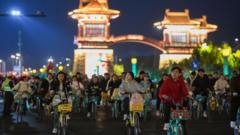Amid soaring enthusiasm for a viral night cycling trend, Central China found itself in turmoil as thousands of cyclists endeavored to travel from Zhengzhou to Kaifeng in search of delectable dumplings. The event, which started innocently enough with local university students biking the 50km route, spiraled into a massive gridlock that overwhelmed local infrastructure.
Originally sparked by a small group’s quest for guantangbao, the trend—dubbed "Night Ride to Kaifeng"—quickly attracted the attention of social media users across the region. Encouraged by state media and local authorities aiming to boost the city's economy, a wave of cyclists hit the streets, leading to unprecedented congestion on key expressways, including a six-lane thoroughfare.
As traffic chaos ensued, cyclists were met with loudspeaker announcements from police urging them to disperse. The surge of bikes overwhelmed traffic safety measures, and rental firms preemptively attempted to control the situation by threatening to remotely lock bikes taken from Zhengzhou. Yet, despite these efforts, tens of thousands of participants flooded the roads, many motivated by a desire to recapture a sense of youth amid pressures from the challenging job market.
Onlookers reported that the drive, which usually takes an hour, stretched into a three-hour ordeal. For some riders, the reality of the event sharply contrasted with their expectations, leading to several social media posts filled with regret and disappointment. Riders struggled to find transportation and accommodation upon arrival in Kaifeng, leading one user to lament, “I really regret going,” after spending over seven hours on his bike.
As complaints swelled, major bike rental companies advised students to reconsider long-distance night journeys, advocating for safer alternatives such as trains or buses. In an effort to regain order, traffic police in both cities closed off certain cycling lanes following the chaos, echoing a pattern seen with Chinese officials who often implement strict policies on large gatherings amid fears of potential unrest.
Despite the backlash, many youthful participants, like 27-year-old Ms. Li, expressed a yearning for spontaneous and cheerful gatherings. “Because happiness is infectious,” she remarked, highlighting the need for light-hearted experiences in a stressed age.
This event serves as a reflection of the larger societal challenges faced by China's younger generation navigating a complex mix of ambition, burnout, and a search for joy in unexpected places.



















